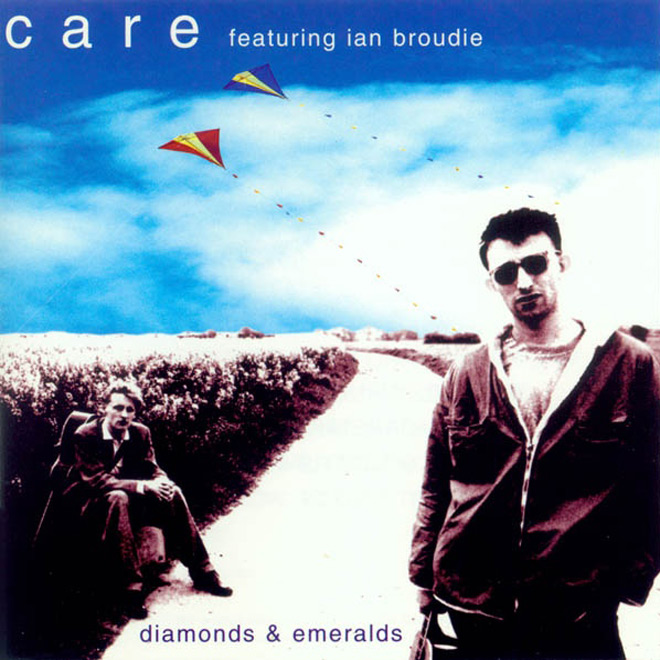While it was not a proper and standard album, Diamonds and Emeralds was and will always be the only gem that any New Wave music enthusiast could ever lay his hands on, to be able to enjoy the meager but entirely majestic outputs of one of England’s best-kept secrets.
Formed in 1983, in Liverpool, England – the country’s heartland of what is known now as New Wave – Care was the short-lived, one-off duo comprised by two pioneering and enduring luminaries of the genre—Paul Simpson (formerly the keyboardist of The Teardrop Explodes! and then vocalist of The Wild Swans) and Ian Broudie (previously of Big in Japan, then Original Mirrors, and currently The Lightning Seeds). The duo began collaborating after the breakup of The Wild Swans in 1983, releasing their first single, “Flaming Sword,” in the same year. Two singles more followed in 1984, but failure to break the market and continuing musical differences with Broudie disillusioned Simpson, who left in 1985 to reactivate The Wild Swans, dissolving Care in the process, for good.
Fortunately, in 1997, Camden label of BMG Records compiled all the available singles, B-sides, and existing demos that Simpson and Broudie had ever recorded under the moniker Care and then released all these as the compilation Diamonds and Emeralds, which has consequently become one of the most well-sought New Wave albums.
Now, it is your turn to show that you care. Celebrate the twentieth anniversary of Diamonds and Emeralds by finding ways to listen to it in its entirety after journeying back through Care’s memory lane via this timely retrospective assessment.
Released on June 15, 1997, Diamonds and Emeralds opened proudly with the buzzing, jangling, and screeching cascade of the shiny title track. The undulating rhythm waved flawlessly into that of the ensuing “An Evening in the Ray,” where Broudie’s propensity for instrumental duels of grand magnitude began to shine through. By the third track, “Chandeliers,” Care’s mélange of Baroque Pop and slightly edgy–type of New Wave was quite clear and in full form—brilliant guitar strums and plucks in shining armors, gorgeous string arrangement dressed in Old Englishman regalia, and Simpson’s cool and breezy baritone. And then came next in brightly burning confidence was Care’s first-ever single, “Flaming Sword,” whose lush string-and-horn orchestration, subtle symphonic interludes, and most significantly, Simpson’s soaring voice made this song grandiose, royal, and anthemic.
Another crystalline of a track played next, the sonically melancholic “Cymophane,” where Simpson’s pained voice was in the same intensity as the dramatic intro and flute-led woodwind patchwork. Care then conjured the clouds of misery with the slow, acoustic but heavily textured, churchy Baroque ballad “Love Crowns and Crucifies,” which was supposed to be the title of their unpursued proper album of old.
“Temper Temper” was Care in their most rocking moment – four-on-the-floor drumbeats, steady bass, angular guitar strums, with only minimal orchestration yet an intricate guitar interlude, which served as a prelude to the seemingly simple harmonies of the actually intricately arranged and faintly ominous “White Cloud.” The rhythm of “Caretaking” then swayed and swung even more slowly, complementing the brooding and contemplative sentiments of Simpson, who repeatedly lamented in the perhaps lowest depth of his baritone, “I am forever lonely.”
The album’s midsong was also the highlight and the summit of Care’s music—“My Boyish Days,” which with its splendid structure, intricate instrumentation, and lyrical content served as the perfect anthem to the now never to be forgotten glorious heyday of the flamboyant ’80s New Wave generation. Long before Morrissey’s proclamation of the Queen’s death, Simpson had already been singing similar sentiments about his beloved country: “Sad Day for England,” indeed. Another tribute to England’s usually forgotten heroes played next in the form of the upbeat, dancey, playful, tuneful, and sailing melodies of “Soldiers and Sailors.”
And now, the greatest ignored and undiscovered song of the whole of New Wave music—“Whatever Possessed You,” Care’s final single in their heyday, remains tear-pulling and spine-tingling…chilling, timeless, classic. “Never darken my door / Whatever possessed you all / Somewhere there’s an end to this / Woe betide me / I wouldn’t dream of it…” That was Simpson in his most romantic, poetic, and bravest.
“Such Is Life” was another intricately woven and dramatically expressed bittersweet surrender to fate; by this point the matrimony of Simpson’s cold vocal and lyrical predisposition and Broudie’s warm instrumentation had really given birth to something unique, special, and wonderful. And then an apt sequel to the previous track, at least lyrically speaking, ”What Kind of World” came across as a Synthpop ballad, a foreshadowing of Broudie’s eventual excursion with his later band, the equally lovable The Lightning Seeds. “Nature Prayed Upon” was another loose, Rock-oriented stomper, but still shiny with a gloss of Broudie’s ornate production.
After a reprise of “Flaming Sword,” albeit in its twelve-inch version, Care delivered its penultimate swansong, the piano instrumental “Misericorde,” which was actually a Chopin-inspired variation of the previous track and their first single. Finally, Diamonds and Emeralds bade goodbye with the aptly farewell-sounding lullabies “Besides 1 & 2.” And never did they come back again…the same…together, ever. Diamonds and emeralds, indeed—elusive, hard-to-find, precious…much coveted, well-loved…forever. Care.







Thank you Sir Alfie for doing a review on this band. I enjoyed reading your article Learned something new about them.
Thanks, Arvin, for taking the time to comment also after reading. Words like this add up to the sparks on inspiration that continue to kindle my restless literary spirit.
I really ensured that I got to review this album in the last days of December. It was my chance to do a retrospective on Care’s one-and-only album–which it truly deserved.
I still had lots on my list last year that I failed to review for the lack of time.
I hope that I can finish everything that I have listed for this year, 2018–albums released in 1978, 1983, 1988, 1993, and 1998.
Till next!
Come by again.